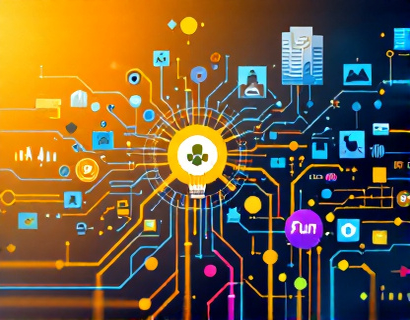Next-Gen Login Management: Elevating Online Security and Convenience
In the digital age, managing multiple online accounts has become an everyday task for tech-savvy individuals. The challenge lies not only in remembering complex passwords but also in ensuring these credentials remain secure from potential threats. Traditional methods of handling multiple logins, such as writing them down or using weak password managers, pose significant security risks. This is where next-generation login management solutions come into play, offering a blend of advanced security features and user-friendly interfaces to simplify and secure access to various online platforms.
Understanding the Need for Advanced Login Management
The proliferation of online services has led to an explosion in the number of accounts individuals need to manage. From email and social media to banking and e-commerce, each platform requires a unique set of credentials. The human brain is not designed to remember an unlimited number of complex passwords, leading to practices that compromise security. According to recent studies, the average person manages around 100 online accounts, each with its own set of login credentials. This not only strains memory but also increases the risk of password reuse and weak password creation.
Traditional password managers, while helpful, often fall short in providing a seamless and secure experience. They can be cumbersome to set up, require regular updates, and sometimes lack robust security features. The need for a more sophisticated solution is evident, one that not only stores and manages credentials but also enhances overall online security without sacrificing convenience.
Key Features of Next-Gen Login Management Solutions
Next-generation login management software is designed to address these challenges by offering a comprehensive set of features that prioritize both security and user experience. Some of the key features include:
- Multi-Factor Authentication (MFA): Adding an extra layer of security by requiring users to verify their identity through multiple methods, such as a password and a one-time code sent to a mobile device.
- Biometric Verification: Utilizing fingerprint or facial recognition to provide a secure and convenient way to access accounts.
- Automatic Login: Seamlessly logging users into their preferred applications without the need to manually enter credentials.
- Real-Time Alerts: Notifying users of any suspicious activity or login attempts from unknown devices.
- Cross-Platform Syncing: Ensuring that credentials and settings are synchronized across all devices, providing a consistent experience whether on a desktop, tablet, or smartphone.
- Password Generator and Strength Checker: Helping users create strong, unique passwords for each account and verifying their strength.
These features collectively enhance the security of online accounts while making the login process more convenient and user-friendly.
Enhancing Security Through Advanced Technologies
Next-gen login management solutions leverage cutting-edge technologies to provide robust security measures. One such technology is blockchain, which can be used to create decentralized and tamper-proof storage for login credentials. This ensures that even if one part of the system is compromised, the overall security remains intact.
Another advanced feature is artificial intelligence (AI) and machine learning (ML), which can analyze user behavior patterns to detect anomalies and potential security threats in real-time. For instance, if a user suddenly logs in from a new location or device, the system can flag this activity and prompt additional verification steps.
Encryption plays a crucial role in protecting sensitive data. Advanced encryption algorithms ensure that credentials are stored securely and are unreadable to unauthorized parties. Additionally, zero-knowledge proofs allow the system to verify the user's identity without revealing the actual password, adding another layer of security.
User Experience: Simplifying the Login Process
While security is paramount, the ultimate goal of a next-gen login management solution is to enhance the user experience. A well-designed interface should be intuitive and easy to navigate, reducing the learning curve for new users. Here are some ways these solutions simplify the login process:
First, automatic login eliminates the need to manually enter credentials, saving time and reducing frustration. Users can set up their preferred applications to log in automatically upon opening, ensuring a smooth and seamless experience.
Second, contextual login options adapt to the user's current situation. For example, if a user is on a public Wi-Fi network, the system can prompt for additional verification steps to ensure security. Conversely, on a trusted device, the login process can be streamlined for convenience.
Third, customizable dashboards allow users to organize their accounts and access frequently used services with a single click. This not only saves time but also helps users keep track of their online presence.
Privacy Considerations in Login Management
Privacy is a critical concern for users when it comes to managing their online accounts. Next-gen login management solutions prioritize user privacy by implementing strict data protection policies. This includes:
- Data Minimization: Only storing essential information necessary for login and account management, minimizing the risk of data breaches.
- Transparent Privacy Policies: Clearly outlining how user data is collected, used, and protected, building trust with users.
- User Control: Providing users with granular control over their data, including the ability to export, delete, or modify their information as needed.
- Compliance with Regulations: Adhering to global privacy standards such as GDPR and CCPA to ensure legal compliance and protect user rights.
By focusing on privacy, these solutions not only enhance security but also reassure users that their personal information is handled with care.
Integration with Existing Platforms
One of the significant advantages of next-gen login management solutions is their ability to integrate seamlessly with a wide range of online platforms. This interoperability ensures that users can manage all their accounts from a single interface, regardless of the service provider. Support for popular platforms includes:
- Email Providers: Gmail, Outlook, Yahoo, and others.
- Social Media: Facebook, Twitter, Instagram, LinkedIn.
- Banking and Finance: Various banks and financial institutions.
- E-Commerce: Amazon, eBay, Shopify.
- Cloud Services: Google Drive, Dropbox, OneDrive.
This broad compatibility ensures that users can maintain a unified view of their online presence without the need to manage separate login interfaces for each service.
Case Studies and Real-World Applications
To illustrate the benefits of next-gen login management, consider a few real-world scenarios:
Scenario 1: Business Professionals - A marketing manager needs to access multiple email accounts, CRM systems, and project management tools throughout the day. With a next-gen login manager, they can set up automatic logins, receive real-time alerts for suspicious activity, and ensure that all credentials are securely stored and updated.
Scenario 2: Remote Workers - A software developer working from different locations can use a login manager to securely access company resources, cloud storage, and collaboration tools, all while maintaining a high level of security and privacy.
Scenario 3: Online Shoppers - An avid online shopper can use a login manager to store payment information and login credentials for various e-commerce sites, ensuring a smooth shopping experience while protecting sensitive financial data.
These scenarios demonstrate how next-gen login management solutions can enhance both security and convenience across different aspects of digital life.
Future Trends in Login Management
The landscape of login management is continually evolving, driven by advancements in technology and changing user needs. Some emerging trends include:
Voice Authentication: Utilizing voice recognition to verify user identity, offering a hands-free and secure alternative to traditional methods.
Behavioral Biometrics: Analyzing user behavior patterns, such as typing rhythm and mouse movements, to authenticate users without the need for additional inputs.
Quantum-Resistant Cryptography: Preparing for the future of computing by implementing encryption methods that are resistant to quantum attacks, ensuring long-term security.
These innovations promise to further enhance the security and convenience of login management, making it even more robust and user-friendly.
Conclusion
Next-gen login management solutions represent a significant leap forward in online security and convenience. By combining advanced security features with a user-centric design, these tools empower individuals to manage their multiple online accounts securely and efficiently. As technology continues to evolve, the importance of robust login management will only grow, making it an essential aspect of digital life. Embracing these solutions not only protects sensitive information but also enhances the overall online experience, ensuring that users can focus on what truly matters in the digital world.










































